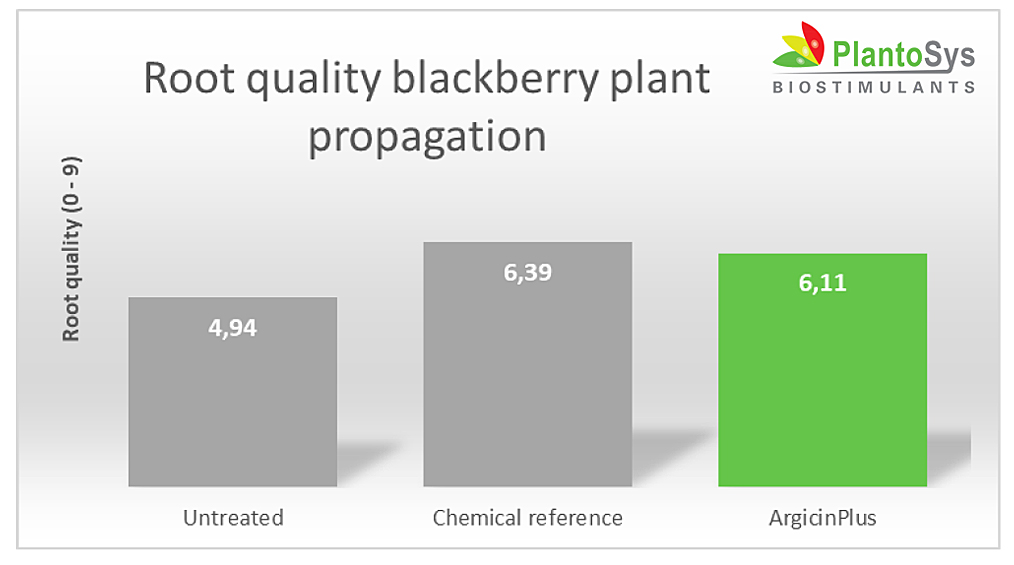Floricanes are the most commonly grown type of blackberry. These are varieties with a two-year cycle. The canes grow during the first year and flower and fruit a year later. Especially during propagation, but also later during the production phase, the blackberry is susceptible to stress. This requires additional attention and vigilance as the crop only starts to make money in the second year. You can largely stay ahead of stressful situations by increasing plant resilience. Biostimulants help you to do this in a natural way. What options are there for integration within the cultivation plan, both during propagation and production?
Propagation of long canes with plenty of flower buds requires a good balance of moisture, nutrition, light, temperature and CO2. Every type of stress, such as heat, mineral deficiency or mildew, negatively impacts this balance.
To ensure internal and external growing conditions after planting out can be achieved as quickly as possible and maintained, we recommend treating blackberry plants weekly with ArgicinPlus. ArgicinPlus is a ‘green booster’ that contains silicon, willow bark extract and colloidal silver. This ensures robust plants that have a head start. They grow faster and are capable of producing more fruit until the end of the season. ArgicinPlus stimulates root development, your plants therefore have a greater capacity to absorb water and nutrients.
The use of ArgicinPlus during propagation of blackberry plants results in a better root system, great root quality and a high number of canes. Research by Delphy ISFC with the variety Loch Ness demonstrates this. The results are at similar levels to the 100% chemical reference level. The canes treated with ArgicinPlus contain a higher proportion of calcium, magnesium, sulphur, phosphate, nitrogen and boron.

Recommended dosage/advice for use - ArgicinPlus (blackberry propagation)
ArgicinPlus isn’t only recommended during propagation, but in commercial growing too it will make your plants as resilient as possible. If your crop has to contend with heat or other stress conditions during growth, we recommend supplementing the weekly schedule of ArgicinPlus with Cuprum. Cuprum is a fertiliser with CE marking that contains micro copper. Copper further strengthens your plants and has a function in the production of growth-stimulating proteins.
Recommended dose/advice for use - ArgicinPlus (commercial blackberry growing)
Plenty of good quality water is important for undisturbed growth. Getting this water to the blackberries requires a properly functioning irrigation system with no blockages. Minimise the risk of blockages through the use of water-maintenance products Blue Bac-1 and Blue-Bac-2. Both are 100% natural products formulated from different bacteria.
Blue Bac-1 contains useful and harmless bacteria that reduces algae growth to a minimum and clears the irrigation water. Blue Bac-1 also boosts the digestion process of dead algae.
Recommended dose/advice for use - Blue Bac-1
Blue Bac-2 is formulated from special Bacillus bacteria. These bacteria produce enzymes that form a very smooth ‘coating’ on the inner walls of pipes, hoses and drippers, which organic contaminants, such as sand or phosphate deposits cannot adhere to. This brings an end to the dreaded green film. In practice, we also see a great side-effect of Blue Bac-2; the bacteria that are present boost root development.
Recommended dose/advice for use - Blue Bac-2
Take care with hydrogen peroxide
The recommended products ArgicinPlus and Cuprum are organic products which are broken down if used in irrigation water to which hydrogen peroxide (H2O2) has been added. Blue Bac-1 and Blue Bac-2 are natural alternatives to H2O2 or other chemical disinfectants. If you nevertheless wish to use hydrogen peroxide in addition to ArgicinPlus and Cuprum, contact our advisor to discuss our solution.
Is everything clear?
Do you have any questions or would you like tailor-made advice concerning your own cultivation situation? Contact your dealer or our advisor Alwin Scholten. Alwin can be contacted on telephone number + 31 (0)6 49 33 49 30, or by email on alwin.scholten@plantosys.nl.
The use of our fertilisers and biostimulants does not affect bees, bumblebees and natural predators.

Your contact person
Alwin Scholten